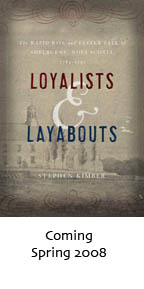When plausible denial becomes impossible
Back in my long-lost Dalhousie University days, there was this big galoomphy guy named David MacKinnon who used to hang around the student newspaper office. MacKinnon wore unlaced army work boots, sported a perpetual blond bedhead and peppered his inevitably coarse conversation with references to “revolution” and “the pigs.”
During the late sixties, he flitted on the fringes of any number of vaguely left-wing campus groups and causes, never quite fitting in, distinguishing himself mostly by his attempts to sound more radical than anyone else and by his eagerness for action against “the man.”
At one point, he apparently single-handedly translated that eagerness into real action —planting a crude explosive device inside the Ralston federal building on Hollis Street and claiming credit in the name of some non-existent radical group. The device did little damage, but it didn’t stop MacKinnon from bragging about his exploits. Which was more than enough to convince anyone who had ever encountered him to steer well clear of him and his craziness.
It was later revealed that MacKinnon had been a police informer and agent provocateur all along. His story was eventually documented in a book by Canadian investigative journalist John Sawatsky.
In the early seventies, when I was beginning my career as a journalist, a couple of RCMP security and intelligence agents took me out for a long boozy lunch at the Old Mill Tavern in Dartmouth. They steered the conversation around to people I’d known in university — none of them nearly as dangerous to Canada’s peace, order and good government as MacKinnon — and invited me to become an informant. I thanked them for lunch and ran.
Given all of that, I’m surprised I was surprised last week when I belatedly realized the Sûreté du Québec had indeed dispatched masked, rock-wielding police agents to provoke violence at a peaceful protest outside the Fairmont Le Château Montebello hotel during the North American leaders’ Security and Prosperity summit.
I know, I know.
The SQ denies its high-minded, law-abiding officers — whose actions were captured on video — did anything wrong. “At no time did the police… act as instigators or commit criminal acts,” the force said in a statement, in which it sounded deeply wounded that anyone could suggest otherwise. “It is not in the police force’s policies, nor in its strategies, to act in that manner.”
The only problem with this denial is that it followed that denial — a claim that its officers weren’t involved at all. That statement became — as Richard Nixon’s press secretary, Ron Zeigler, once famously put it — “inoperative” only after a YouTube video of the officers in action spread like grassfire across the Internet and onto the mainstream media, making implausible the usual attempts at plausible deniability.
So why should we believe them now?
We shouldn’t.
We should be demanding answers — not just from the SQ but also from the RCMP, which refuses to say what it knew about its provincial counterparts’ provocative plans during the summit; from Stockwell Day, our Public Safety Minister, who doesn’t seem to believe the public safety of peaceful protestors in a democratic society is a matter for his concern; and, of course, from Prime Minister Stephen Harper, whose pompous dismissal of the summit demonstrators as “sad” may have encouraged police to believe they had permission to stomp on their democratic rights.
Without some sort of public inquiry, it’s impossible to understand where these lunatic schemes actually come from — and what can be done to prevent them in the future.
What, if anything, did those responsible expect to accomplish? Was it a legitimate if dumb-as-dirt attempt to head off more serious violence? Or was someone trying to discredit the legitimate demonstrations? Or create some real action for over-trained, under-used riot squads? And who was really responsible? Were these rogue officers? Did they get direction from higher-ups? Was there political involvement?
Despite growing calls from opposition politicians, unions and social activists for a broader public inquiry into police misbehaviour, there is little likelihood that this government — which, in its blinkered ideological way, sees legitimate protestors as an “enemy” to be dealt with — will take any positive action.
That probably won’t happen until some, even more outrageous revelation emerges — that the police have burned a barn, for example, or stolen legitimate political party membership lists in the name of some misguided notion of public security, as happened in the late seventies — and finally forces the government-of-the-day to appoint a royal commission.
It’s a shame it will only likely happen after some incident makes plausible denial totally impossible and finally renders inoperative the notion that “our” police forces wouldn’t do such things. Again.
Stephen Kimber is the Rogers Communications Chair in Journalism at the University of King’s College. His column, “Kimber’s Nova Scotia,” appears in the Sunday Daily News.
His novel Reparations, was shortlisted for the Arthur Ellis First Novel Award
and for the 2007 Dartmouth Book Award for Fiction.
•
His profile of Det. Tom Martin for The Coast
was selected as a "Notable Narrative" by Harvard’s Nieman Narrative Digest.
•
Cardiac Unrest, his Coast cover story on heart researcher Dr. Gabrielle Horne’s troubles
with the Capital District Health Authority won honourable mention in the Enterprise Reporting category of the 2007 Atlantic Journalism Awards.








 STEPHEN KIMBER, a Professor of Journalism at the University of King's College in Halifax and co-founder of its MFA in Creative Nonfiction Program, is an award-winning writer, editor and broadcaster. He is the author of two novels and eight non-fiction books. Buy his books
STEPHEN KIMBER, a Professor of Journalism at the University of King's College in Halifax and co-founder of its MFA in Creative Nonfiction Program, is an award-winning writer, editor and broadcaster. He is the author of two novels and eight non-fiction books. Buy his books